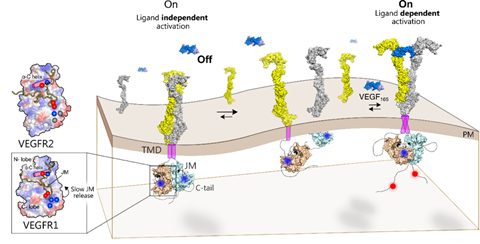Kolkata: In a groundbreaking study, researchers at the Indian Institute of Science Education and Research (IISER) Kolkata have decoded the molecular mechanism through which a cell surface receptor, VEGFR1, regulates critical cellular functions and prevents cancer. This discovery has significant implications for developing medical solutions for colon and renal cancers.
The enzyme VEGFR1, a member of the Receptor Tyrosine Kinases (RTK) family, plays a crucial role in cell differentiation, proliferation, survival, metabolism, and migration. It remains autoinhibited, or self-inhibited, in the absence of a ligand, such as a hormone. The researchers have found that molecules which stabilize the inactive state of VEGFR1 could be used to develop therapies for certain cancers.
RTKs are essential for converting extracellular signals from chemical cues like growth factors into regulated cellular responses. Ligand binding to extracellular receptors activates intracellular tyrosine kinases, which add phosphate groups to tyrosine molecules, forming a signaling complex. This complex regulates various cellular functions, including cell growth, development, and immune responses. However, spontaneous activation of RTKs without ligands is linked to multiple human pathologies, including cancers, diabetes, and autoimmune disorders.
IISER Kolkata researchers focused on the Vascular Endothelial Growth Factor Receptor (VEGFR) family, which is key in generating new blood vessels—a process vital for embryonic development, wound healing, tissue regeneration, and tumor formation. Targeting VEGFRs can treat various malignant and non-malignant diseases.
The study revealed a stark difference between two VEGFR family members: VEGFR1 and VEGFR2. While VEGFR2 can be spontaneously activated without its ligand, VEGFR1 remains autoinhibited, even when overexpressed in cells. VEGFR1 acts as a “dead enzyme,” binding to its ligand VEGF-A with ten-fold higher affinity than VEGFR2, inducing only transient kinase activation.
Activation of VEGFR1 has been linked to cancer-associated pain, tumor cell survival in breast cancer, and the migration of human colorectal cancer cells. Dr. Rahul Das and his team at IISER Kolkata discovered that a unique ionic latch present only in VEGFR1 keeps it autoinhibited in the basal state. This latch hooks the juxtamembrane segment onto the kinase domain, stabilizing VEGFR1’s autoinhibited conformation.
The researchers proposed a critical role for cellular tyrosine phosphatase in modulating VEGFR1 activity. Their work, conducted at the Analytical Biology Facility at IISER Kolkata, highlighted the therapeutic potential of phosphatase modulators in regulating VEGFR1-mediated pathological angiogenesis, a process that takes place in cancer.
Published in the journal Nature Communications, this discovery could pave the way for new therapeutic interventions against pathological conditions caused by the spontaneous activation of VEGFR signaling. Small molecules targeting the autoinhibited state of VEGFR1 show promise for treating cancers such as human colorectal carcinoma and renal cancer, where VEGFR1 is overexpressed.





